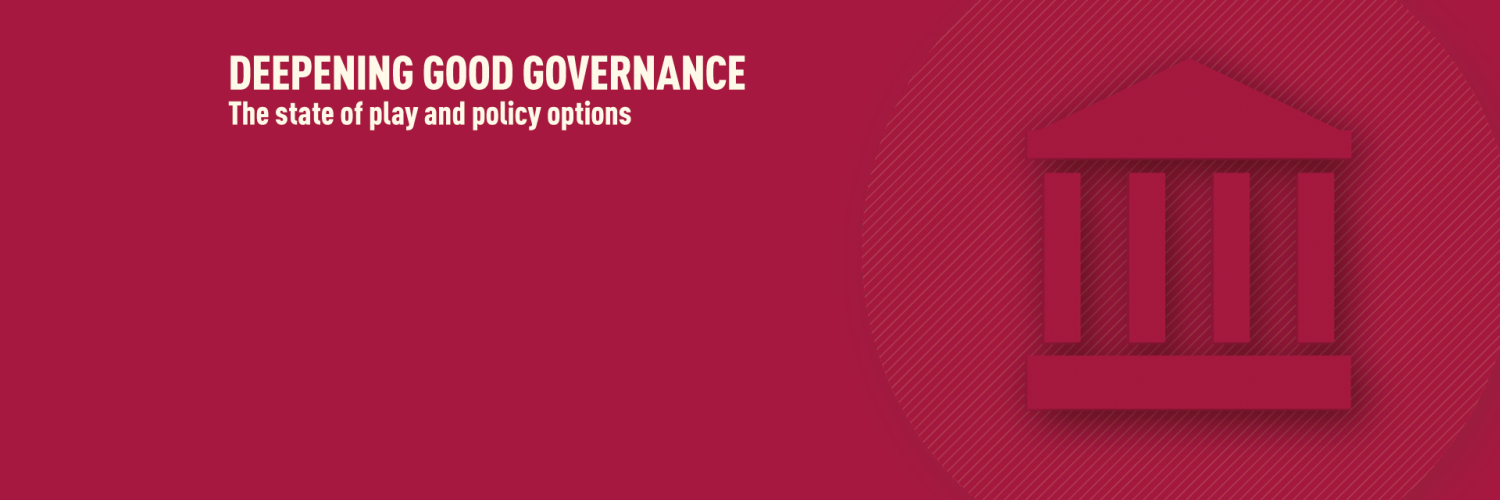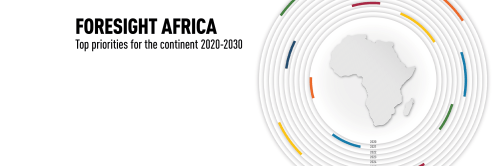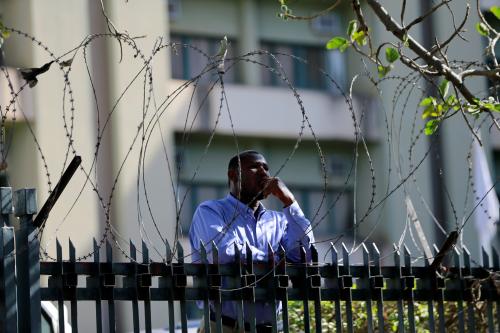Below is Chapter 2 of the Foresight Africa 2020 report, which explores six overarching themes that provide opportunities for Africa to overcome its obstacles and spur inclusive growth. Download the paper to see the contributing viewpoints from high-level policymakers and other Africa experts.

Among the seven key aspirations listed in Agenda 2063: The Africa We Want1—the African Union’s (AU) shared 50-year development and transformation program for realizing the full potential of the continent—one stands out in its interconnectedness: “[a]n Africa of good governance, democracy, respect for human rights, justice and the rule of law”2 [emphasis added]. The key to Africa’s political and economic transformation in the next decade is found in this aspiration. Indeed, as former United Nations Secretary-General Kofi Annan said, “Good governance is perhaps the single most important factor in eradicating poverty and promoting development.”
Progress on good governance has been encouraging, but challenges remain
African countries continue to build on the governance gains that they have achieved since the early 1990s. According to the African Development Bank, good governance should be built on a foundation of (I) effective states, (ii) mobilized civil societies, and (iii) an efficient private sector. The key elements of good governance, then, are accountability, transparency, combating corruption, citizen participation, and an enabling legal/judicial framework.3
Since then, many African countries have undertaken institutional reforms that have significantly changed their governance architectures and put in place a new set of leaders. Since the early 1990s, for example, Ghana has diligently undertaken governance reforms, including the design and adoption of new democratic constitution, which places emphasis on the separation of powers with checks and balances to transform its political system. Ghana subsequently became a role model in the institutionalization of democratic rule, as illustrated by the quick acceptance of defeat by incumbent President John D. Mahama during the 2016 elections.
More broadly, over the past decade, Kenya, Morocco, and Côte d’Ivoire have led the way. The Ibrahim Index of African Governance indicates that between 2008 and 2017, these countries experienced significant improvements, particularly in overall governance.4 Specifically, Côte d’Ivoire registered the greatest improvement in overall governance during the period 2008–2017 (+12.7 points), followed by Morocco (+7.3 points) and Kenya (+6.1 points).5
Fighting poverty and improving human development in Africa must begin with the creation of wealth, a process that requires the existence of a robust entrepreneurial class.
But Africa has a long way to go: Too many countries have not yet achieved the type of reforms that can prevent dictatorship, corruption, and economic decline. Due to continued sectarian violence, weak and ineffective leadership, and lack of political will, countries like the Central African Republic, Eritrea, Somalia, and South Sudan remain saddled by poor-functioning governance structures.6 The absence of good governance in many African countries has been extremely damaging to the government’s corrective intervention role, particularly in the maintenance of peace and security, as well as the promotion of economic growth and the creation of the wealth needed to confront poverty and improve human development.
Without good and inclusive governance, Africa will not achieve its social and economic targets
It is imperative that countries entrench mechanisms that promote constitutionalism, accountability, democracy, and good governance if Africa is to achieve its development goals. For example, although there has been a substantial decline in the share or proportion of Africans living in extreme poverty—from 54 percent in 1990 to 41 percent in 2015—the number of Africans living in poverty has actually increased from 278 million in 1990 to 413 million in 2015.7 Unless effective anti-poverty and pro-poor policies are implemented in African countries; global poverty will become increasingly African. Indeed, the least developed countries in the world (as determined by the United Nations Development Program’s Human Development Index) are also countries with relatively weak, dysfunctional, or ineffective governance structures (as determined by the Ibrahim Index of African Governance). These include the Central African Republic, Chad, the Democratic Republic of the Congo, Equatorial Guinea, Eritrea, Libya, Somalia, South Sudan, and Sudan.8
Fighting poverty and improving human development in Africa must begin with the creation of wealth, a process that requires the existence of a robust entrepreneurial class. In order to achieve these goals, there must be peace and security—especially the peaceful coexistence of the various ethnocultural groups that inhabit each African country. Unfortunately, weak and dysfunctional governance structures continue to prevent many African countries from creating and sustaining the necessary enabling environment for peaceful coexistence, entrepreneurship, and wealth creation. In fact, in countries such as Cameroon, the DRC, and South Sudan, the absence of governance structures undergirded by the rule of law has failed to halt ethnic-induced violence. That violence stunts entrepreneurship and economic growth in these countries. Peace and security, which are a sine qua non for entrepreneurial activities and the creation of wealth, are unlikely to return to these countries without the provision of participatory and inclusive governance structures.
Weak governance manifests itself in other ways as well: Too often dysfunctional governance processes persist, creating environments where civil servants and political elites act with impunity, embezzling scarce public resources that could be used for education, healthcare, infrastructure, water treatment plants, electricity, farm-to-market roads, or technology. Elites are usually not incentivized to implement pro-poor economic programs that enhance the ability of the poor to participate productively and gainfully in economic growth, such as public investments in primary and secondary education, clean water, basic health care, and child nutrition.
Bolstering good and inclusive governance through 2030 and beyond
The type of governance structure that each African country should strive for over the next decade is one that should address peaceful coexistence and economic development, inequality, the effects of climate change, health pandemics, and enhanced regional cooperation, as well as ensure the full and effective participation in both the economic and political systems of groups that have historically been marginalized (e.g., women, youth, and ethnic and religious minorities). Each country must reflect upon its own governance challenges and engage in robust national dialogue on institutional reforms to enable an effective and inclusive governance system.
First, countries in or recovering from crises must engage in process-driven constitution-making to produce an agreed-upon governing process characterized by the separation of powers, with effective checks and balances, including a robust and politically active civil society; an independent judiciary; and a viable, free, and independent press. The process through which the constitution is designed and adopted must be participatory and inclusive enough to allow for all relevant stakeholder groups to participate—from the development of constitutional principles to the actual design and ratification of the constitution. It is especially important that historically marginalized groups be empowered to participate fully and effectively in the constitution-making process. Each country must also produce a set of constitutional principles to inform, guide, and constrain the drafters. Such principles should ensure that the constitution safeguards against abuses of power. Importantly, each constitution should have a robust amendment process, one that can effectively prevent the manipulation of the constitution by opportunistic executives to remain in power indefinitely, as we are currently experiencing in several countries.
The type of governance structure that each African country should strive for over the next decade is one that should address peaceful coexistence and economic development, inequality, the effects of climate change, health pandemics, and enhanced regional cooperation.
Second, the countries that have progressive and inclusive constitutions undergirded by the separation of powers, including Ghana, Kenya, and South Africa, should engage in national dialogues to help their citizens understand and better appreciate the importance of the constitution to governance generally and the protection of human rights in particular. Through this process, citizens can determine how to strengthen their national constitutions (e.g., add a Bill of Rights).
Third, all African countries, with the aid of civil society, should develop and implement education programs to help citizens understand and appreciate the constitution and its provisions, and recognize the law as a tool that they can use to organize their private lives and resolve their conflicts, including those arising from trade and other forms of exchange. Programs for empowering youth and women could be particularly fruitful.
Fourth, each African country should engage in regular dialogue, where necessary, to revisit such important governance issues as the centrality of human rights in the structure of the country’s constitution, as well as a strong and independent judiciary. Countries should also ensure that governance is inclusive of women and youth, who have historically been marginalized, as well as cultivate transformative leadership at all levels of government.
Finally, each country’s citizens, especially its legal and constitutional scholars, including those in the diaspora, should play an important role in shaping the institutional and legal environment for the transformation of Africa’s governance architecture during the next decade.
It is unlikely that the continent will be able to successfully and effectively implement and achieve the Sustainable Development Goals in 2030 or Agenda 2063 unless institutions are reformed to enforce good governance undergirded by the rule of law. The policies outlined will help the region accelerate good governance and support its economic transformation.
-
Footnotes
- African Union Commission, Agenda 2063: The African We Want: First Ten-Year Implementation Plan, 2014–2023 (Addis Ababa: African Union Commission, 2015).
- Rachel Gisselquist, “What Does ‘Good Governance’ Mean?” United Nations University, January 2012.
- African Development Bank, Bank Group Policy on Good Governance (Abidjan: African Development Bank, July 2000).
- According to the Ibrahim Index of African Governance for 2018, between 2008 and 2017, Kenya moved from 19th to 11th position, Morocco moved from 25th to 15th and Côte d’Ivoire moved from 41st to 22nd. Mo Ibrahim Foundation, 2018 Ibrahim Index of African Governance 2018 (London, UK: Mo Ibrahim Foundation, 2018), p. 17.
- Overall governance is scored out of 100 possible points. Mo Ibrahim Foundation, 2018 Ibrahim Index, p. 17.
- Ibid., p. 16.
- “Accelerating Poverty Reduction in Africa: In Five Charts,” World Bank, October 9, 2019
- See United Nations Development Program, Human Development Index 2018 (New York: Oxford University Press, 2018) and Mo Ibrahim Foundation, 2018 Ibrahim Index.
The Brookings Institution is committed to quality, independence, and impact.
We are supported by a diverse array of funders. In line with our values and policies, each Brookings publication represents the sole views of its author(s).








